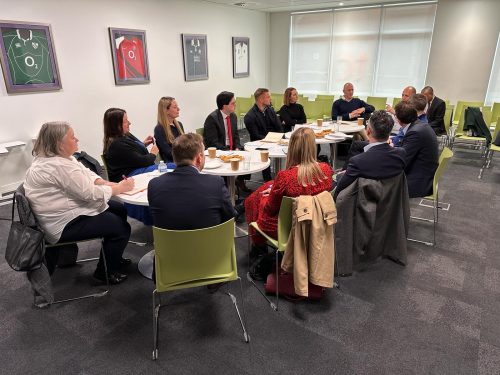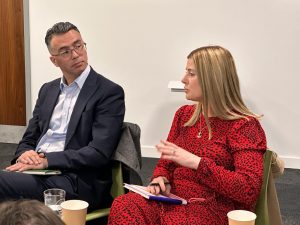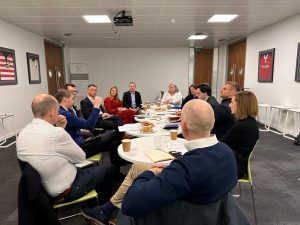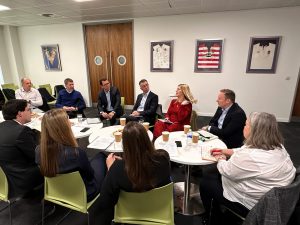Creating a high performance culture in professional and financial services

A study by Edelman/HP of 15,600 staff in 12 countries found only 27% have a healthy relationship with work and 71% are actively looking for new roles.
Taking into account sobering findings such as these, a roundtable discussion organised by TheBusinessDesk.com in partnership with leadership training provider Natural Direction examined how financial and professional services firms in the North should respond.
The roundtable, chaired by TheBusinessDesk.com joint managing director Alex Turner, looked at how businesses can adapt leadership which embraces employee engagement to foster a more dynamic, committed, and motivated workforce.
What management strategies can attract, retain and stimulate professional talent, particularly given the impact of the post-pandemic war for talent?
The roundtable panel of a dozen senior business leaders focused on the generational shift in the workforce, what this younger influx of employees expects from work and how such expectations can be accommodated.
Martin Coburn, owner and managing director of Natural Direction and the Win Academy, said: “There was a time when people would join a particular professional service firm, they’d be delighted to get the role.
“People were very compliant. They’d do pretty much what they had to do to get where they wanted to be.
“Now, rightly or wrongly, there’s a greater sense of entitlement about what people think they should be given. And we’re having to work with that.
“It requires a less traditional form of leadership to motivate people and retain staff in an environment where people feel they’ve got greater choice.”
Picking up on “entitlement”, Andy Ward, market senior partner, Leeds and Bradford, PwC, pointed out this isn’t necessarily exclusive to the younger generation.
He said: “One may argue that where professional services used to recruit from decades ago was actually far more entitled – ie coming from traditional white backgrounds and universities.
“With the younger generations we’re recruiting from a very diverse group of people. And they are people who want better and want more.
“So if you can channel that in the right direction you’ll get some really motivated people.”
Tanya Holt – partner and head of regions at CMS, acknowledged it is important for people to feel comfortable in a professional environment when they spend so much time at work.
Commenting on her company, she added: “We’ve spent a lot of time on various networks – diversity networks, faith networks, carers’ networks, families networks, just so people feel connected within the firm.
“For example, we’ve put on events for Chinese New Year for our Chinese colleagues. We’re thinking about the other cultures within the office. It gives the whole office an understanding of these different cultures which has gone down really well.”
Deborah Warren, legal director at Clarion, said staff at various stages of their career have different priorities.
“What’s important to people coming in at a junior level tends to be things like inclusivity, environmental impact, work in the community,” she said.
“But at a more senior level they are asking what is our working environment like? Will there be training for emerging people? Will I have time go out and do business development as opposed to just chargeable hours?
“This is what they want at their level, which might be different to what attracts more junior entrants.”
Karen Arch, chief people officer at BHP, said: “We’ve spent more time on understanding this younger generation because I think there’s a lot of myths. They are not that different, they want to do well at work.”
She said younger employees want companies to be transparent about what the workplace is like, whether the firm is ethical and they want to know what the salary and benefits are.
She added: “We didn’t used to talk about salaries, it almost seemed rude to ask about salaries in a job interview. We were just grateful we had a job.”
Faye Esgate, Reward manager HR at Leeds Building Society, highlighted the flexibility which senior leaders build into their daily routine – scheduling time for relaxation even amidst busy working schedules.
“People coming in at a junior level may want to have similar flexibility,” she said. “They may want to work differently, at hours which suit when they are most productive.”
Andrew Batterton, office managing partner, Leeds, DWF, said: “We talk about ‘entitlement’ probably because we come from a culture of working for baby boomers who told us what to do and we just went off and did it.
“But we’ve taught this generation to be much more inquisitive and better informed. They have access to information that we didn’t have. I think they are expecting a better level of engagement as a result.
“The next generation coming through have this level of expectation because of the way we’re teaching them in schools and probably as parents.”
Simon Harris, senior office partner, Leeds and joint head of real estate, Eversheds Sutherland, said: “The way people are taught in schools now is very different to the way we were taught.
“And that’s why it’s really important to keep engaged with all generations to make sure our workplace is fit for purpose for everyone.
“There are diverse needs and wants in terms of people’s attitudes towards office working. So it’s on the leadership to make sure we’ve got good strong values that we cascade from the top down and we apply them.”
Mike Thornton, office managing partner, Leeds, RSM, cautioned that efforts to promote workplace inclusivity must be carefully thought through.
He said: “Over the last two or three years as a firm, we had lots of various inclusivity groups for the workforce. To the extent that it almost became a case of a law of diminishing returns.
“We’ve not stopped these activities, because it’s still important to have an inclusive workforce. But we’re trying to make sure that when we do these things they add value to the workforce as a whole.”
Several panel members noted how leadership, career progression and recruitment is changing in response to the younger generation.
Commenting on leadership, Louise Smith, managing director, transaction services, at Interpath, said: “It’s more collaborative. I feel like it’s not as hierarchical as it felt like when I was a junior.
“You take people’s opinions from all levels of the team and you take them to meetings. When I was going through the ranks I hardly ever got taken to a meeting with my partner or boss.
“I reflect on what I wish I had when I was working my way through the ranks and one of the key things was being involved in decisions.”
Chris Lyons, regional director at Michael Page, said his own business had changed how it structures career progression, shifting from a purely results-driven approach.
“We’ve gone from having a fairly black and white career progression, which was typically about results and numbers and what people are delivering,” he said. “The people at the top of the league table ended up in the most senior roles.
“We’ve moved our career progression to being as much focused on behaviours and skills as it is on people’s actual deliverables.
“You’ve got to demonstrate integrity and group vision. And that’s measured over a sustained period of time.”
Addressing recruitment, Matt Pollard, regional head of Yorkshire for Large Corporate, Lloyds Bank, said: “At a junior level our graduate website leads with values. It leads with what the bank is doing in areas such as sustainable finance, social housing, our emissions.
“It is leading with those values to attract a different type of graduate. And the recruits coming through are from a more diverse background, which is a great thing for the business.”












